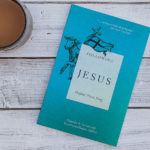Sometimes I wonder if we’ve forgotten what a cross was. We adorn our necks and our sanctuaries with crosses, often gilded in gold. They cover our Bibles and hymnals and books of prayer. It has become a symbol so synonymous with Christianity that its mere presence almost universally signals a desire to be associated with Jesus—and rightly so. For the cross is absolutely essential to the witness that each and every New Testament author provides to Jesus. One simply cannot faithfully tell the story of Jesus without the cross.
Yet, despite its centrality to the story of Jesus, we hardly seem to remember its original purpose. For us, it is has become a symbol of hope. For many living under Roman rule in the first century, however, it was a symbol of oppression and terror, an instrument of torture and death for any who decided to test the power and authority of Roman rule. In a culture built on the notions of honor and shame, it provided a particularly shameful way to end a life, hung up as public spectacle for everyone to see and mock if they so wished.
We Christians worship as our king a guy who was hung on one of these things. If we don’t recognize what an odd choice that is on our part, then I wonder if we’ve forgotten what a cross was: a decree that Rome was in charge and Jesus was not, a sure sign that Jesus had failed, an indicator that he wasn’t the Messiah. Take your pick. None of these messages screams the idea of king—just the opposite. The cross was the surest possible sign that Jesus was not who his followers thought he was. This is why the two disciples on the road to Emmaus articulate their hope in the past tense. “We had hoped,” they say in Luke 24:21. But they don’t hope any longer because they know what a cross means.
It takes the presence of the resurrected Jesus himself to fill the cross with new meaning.
It takes the presence of the resurrected Jesus himself to fill the cross with new meaning. He walks with these disciples on the road and explains to them that it was necessary for the Messiah “to suffer these things” (Luke 24:26). Don’t rush over that statement too quickly because encapsulated in it is one of the most radical claims the New Testament writers repeatedly make: it was necessary that the Messiah should suffer. For these two disciples, and probably most other folks like them in the first century, these two ideas—Messiah and suffering—are mutually exclusive. You can’t do both. The presence of one means the absence of the other. According to Luke, however, Jesus claims it is absolutely necessary that they go together. Jesus can only be Messiah if he is a Messiah who suffers. The only way to his kingdom is through the cross.
Even as Jesus’s resurrection fills the cross with new meaning, it doesn’t erase the original significance. Instead, it serves to vindicate the message and mission of the one who hung upon it and thereby proclaims the cross as central to both. It declares that a Messiah suffering on a cross is what the kingdom of God looks like.To proclaim Jesus as king is to proclaim that the power of God is found in weakness and humility.
So when we set those crosses at the center of our worship spaces and call the crucified one our king, then we also recognize—if we remember what the cross was—that this defines us as a very peculiar kind of people. We are a people for whom the power structures of the world have been turned upside down. Indeed, we are called to turn them upside down ourselves in the way we fellowship with one another and live our lives together before the rest of the world. To be Christian, ambassadors of this crucified Christ, is to be a people who reflect in depth and at length about our relationship to the powers of this world.
More so than the gilded and ornate crosses on necklaces and sanctuary walls, this is what most causes me to wonder if we’ve forgotten the significance of the cross: it seems that we, the church, rarely call into question our own relationship to power. We’ve become accustomed to being a dominant force in our culture, and as we feel that influence waning, we’re tempted to cling to whatever power we have left. We support whatever leader or method of ministry promises to restore us to our place of privilege. We seem to assume that more money, more influence, and more power are the ways to build Christ’s kingdom. That is surely the way most kingdoms are built, but most kingdoms don’t have a crucified king. The cross signifies us as a people whose very essence is to empty ourselves of power and privilege on behalf of others out of our allegiance to the one who did the same for us (see Philippians 2:5–11).
The good news is that, however much we may have failed to grasp the significance of the crucified Messiah, he walks the road alongside us, patiently awaiting the opportunity to open the Scriptures to us. If we will break bread together around the Table and allow our lives to be shaped into the likeness of his own broken body, we will find that our hearts have been set aflame the whole time he journeyed with us.
 David Young is a contributor of Following Jesus: Prophet, Priest, King. In this book, Biblical scholars, pastors, and theologians from around the globe, invite us to re-envision a cross-bearing Jesus—the prophet, priest, and king who upends our preconceptions about his life and ministry.
David Young is a contributor of Following Jesus: Prophet, Priest, King. In this book, Biblical scholars, pastors, and theologians from around the globe, invite us to re-envision a cross-bearing Jesus—the prophet, priest, and king who upends our preconceptions about his life and ministry.





0 Comments